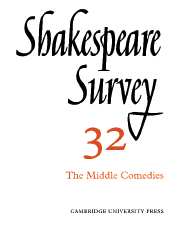Book contents
- Frontmatter
- Shakespeare’s Middle Comedies: A Generation of Criticism
- ‘Perfect Types of Womanhood’: Rosalind, Beatrice and Viola in Victorian Criticism and Performance
- The Stage Representation of the ‘Kill Claudio’ Sequence in Much Ado About Nothing
- As You Like It Adapted: Charles Johnson’s Love in a Forest
- Social Relations and the Social Order in Much Ado About Nothing
- Sexual Disguise in As You Like It and Twelfth Night
- Twelfth Night and the Myth of Echo and Narcissus
- ‘Smiling at grief’: Some Techniques of Comedy in Twelfth Night and Così Fan Tutte
- ‘My Lady’s a Catayan, we are politicians, Maluolios a Peg-a-ramsie’ (Twelfth Night II, iii, 77-8)
- The Importance of Being Marcade
- A Hebrew Source for The Merchant of Venice
- The Marriage Contracts in Measure for Measure: A Reconsideration
- Richard III: Antecedents of Clarence’s Dream
- Deep Plots and Indiscretions in ‘The Murder of Gonzago’
- ‘What is’t to leave betimes?’ Proverbs and Logic in Hamlet
- The Tempest: Language and Society
- Pictorial Evidence for a Possible Replica of the London Fortune Theatre in Gdansk
- A Year of Comedies: Stratford 1978
- The Year's Contributions to Shakespearian Study: 1 Critical Studies
- 2 Shakespeare’s Life, Times and Stage
- 3 Textual Studies
- Index
- Plate section
The Marriage Contracts in Measure for Measure: A Reconsideration
Published online by Cambridge University Press: 28 March 2007
- Frontmatter
- Shakespeare’s Middle Comedies: A Generation of Criticism
- ‘Perfect Types of Womanhood’: Rosalind, Beatrice and Viola in Victorian Criticism and Performance
- The Stage Representation of the ‘Kill Claudio’ Sequence in Much Ado About Nothing
- As You Like It Adapted: Charles Johnson’s Love in a Forest
- Social Relations and the Social Order in Much Ado About Nothing
- Sexual Disguise in As You Like It and Twelfth Night
- Twelfth Night and the Myth of Echo and Narcissus
- ‘Smiling at grief’: Some Techniques of Comedy in Twelfth Night and Così Fan Tutte
- ‘My Lady’s a Catayan, we are politicians, Maluolios a Peg-a-ramsie’ (Twelfth Night II, iii, 77-8)
- The Importance of Being Marcade
- A Hebrew Source for The Merchant of Venice
- The Marriage Contracts in Measure for Measure: A Reconsideration
- Richard III: Antecedents of Clarence’s Dream
- Deep Plots and Indiscretions in ‘The Murder of Gonzago’
- ‘What is’t to leave betimes?’ Proverbs and Logic in Hamlet
- The Tempest: Language and Society
- Pictorial Evidence for a Possible Replica of the London Fortune Theatre in Gdansk
- A Year of Comedies: Stratford 1978
- The Year's Contributions to Shakespearian Study: 1 Critical Studies
- 2 Shakespeare’s Life, Times and Stage
- 3 Textual Studies
- Index
- Plate section
Summary
To judge from the continuing spate of publications on the topic, there seems to be no end to the disagreement over the nature and dramatic significance of the marriage contracts in Measure for Measure – that of Claudio and Juliet, and that between the Deputy Angelo and Mariana. The action of the play is set in motion when Claudio is sentenced to death by Angelo for the crime of fornication, even though he protests his innocence on the grounds that he and Juliet were truly man and wife by a clandestine wedding contract, and that they had kept their union secret only for fear of antagonizing the friends of Juliet, who controlled her dowry (I, ii, 145–55). The first problem is as to the validity of Claudio’s defence. Later, when his sister Isabella appeals to the Deputy to show mercy, she is told that she can save her brother’s life only by submitting to Angelo sexually. The second problem arises when the Duke assures Mariana, a lady once betrothed to Angelo and still in love with him, that she could - without sinning – take Isabella’s place at the proposed assignation with Angelo. The Duke’s assurance that she would not be guilty of fornication in doing so is based on the circumstance that she was formerly contracted to marry Angelo (III, i, 213–30). Why will Mariana be guiltless, if Juliet and Claudio are guilty?
- Type
- Chapter
- Information
- Shakespeare Survey , pp. 129 - 144Publisher: Cambridge University PressPrint publication year: 1980
- 1
- Cited by

